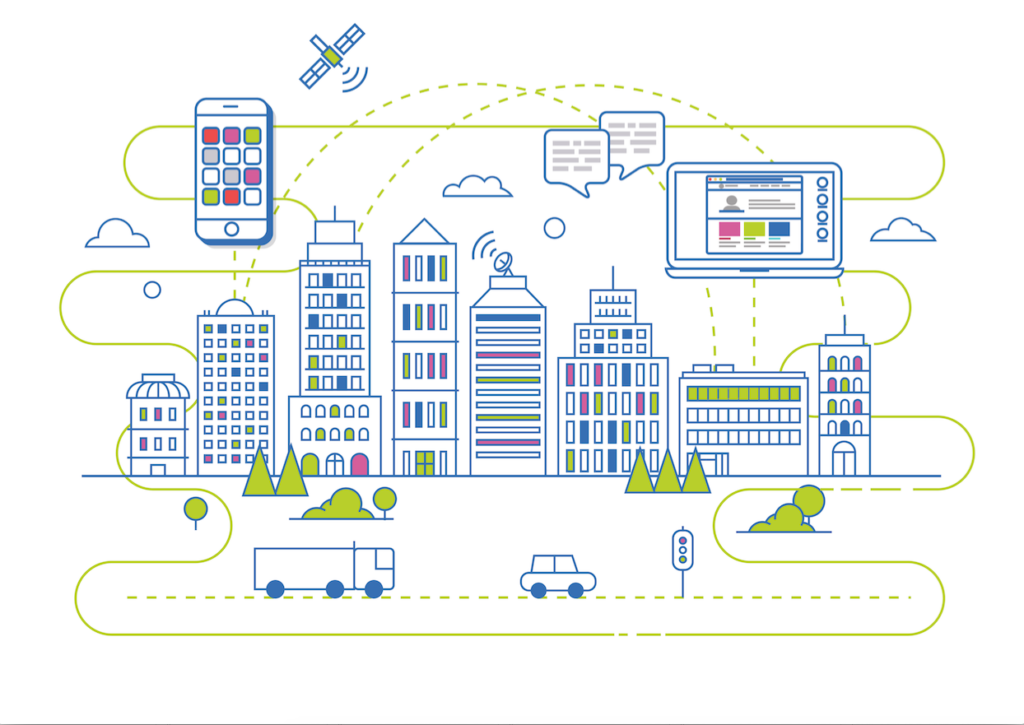
In 2008, the number of people worldwide living in urban population centers surpassed the number of people living in rural areas for the first time in history. The growing population of the world, and the growth of cities in particular, has created numerous challenges for humanity. Cities are often crowded, polluted, and difficult to travel through.
Thankfully, technology has the potential to come to the rescue. Smarter manufacturing processes, greener energy creation, and more eco-friendly automobiles, for example, have helped reduce the major smog problem that once plagued many US cities in years past. With hard work and innovation, we can surely continue finding new solutions to every challenge, protecting our environment, growing our economy, and creating a better, brighter world for both ourselves and our children. The smart cities movement has also taken on a new importance for US cities, given the fact that the United States will no longer be participating in the Paris Agreement on a federal level.
Cities across the US that have stepped up big time when it comes to implementing smart city practices locally. Here are a few of our recent favorites.
Austin, Texas
Austin has long been a hotbed for innovation and new ideas; its booming technology and green energy sectors have also helped make the city one of the fastest growing population centers in the nation.
Since the city still ranks as one of the most congested cities in the US, it makes sense that Austin decided to focus a lot of their smart city initiatives on mobility. The city plans to create a Mobility Innovation Center to incubate new ideas for smart mobility including: automating and connecting vehicles; increasing sensor systems throughout the city to collect data; and packaging mobility options for citizens in order to make it easier for them to use a variety of public transportation options.
Austin’s smart-grid and data-based transportation system and its ambitious goal of being a net zero greenhouse gas emitter by 2050 have earned it a spot as a finalist in the Transportation Department’s “Smart City Challenge.” Austin will be hosting the Smart Cities Connect Conference and Expo from June 25th through 28th.
Los Angeles, California
Traffic in Los Angeles is notoriously bad, and the city is banking on its Smart Cities initiative to help solve this problem, among others. The innovative Geo Hub data collection and aggregation program has allowed LA city officials to analyze their local environment as an integrated whole. Some of the most tangible results of the Geo Hub effort can be seen in the city’s road system, which not only enjoyed increased paving and repair efficiency after the introduction of the new program but also got the digital treatment with a real-time incident reporting system known as Street Wize.
With the Street Wize, LA residents and travelers can look at an interactive map to identify areas of the city that are experiencing construction, road closures and other disruptions that can cause traffic issues. This map allows drivers and passengers in LA to determine ideal alternative routes that can cut down on congestion and avoid traffic jams caused by accumulating traffic in an area that’s experiencing some sort of disruption.
Portland, Oregon
Another finalist for the Smart City Challenge, Portland, Oregon is working on overhauling its urban transportation system, all while making a special effort to ensure that everyone’s voice is heard and everyone’s needs are considered. Utilizing walking and van tours, ideal walls, supper chats, and youth-led canvassing, and partnerships with local community organizations, the city is working hard to “ensure that all communities have access to new transportation options and improved methods for making informed transportation choices.” This on-the-ground approach to collecting genuine community input is key to constructing smarter transportation infrastructure.
Getting Smart in Your Area
While these are just a few examples we found particularly inspiring, smart initiatives are developing in cities across the US. In 2015, then-president Barack Obama announced a nationwide Smart Cities effort, pointing to crime, economic growth, traffic congestion and healthcare as primary areas of concern for this technology-focused public works effort. Even if federal funding for these forward-thinking efforts dries up, individual communities can still band together to bring their local infrastructure into the 21st century where it belongs. Mobile apps like GoKid are just one way to get smart on a grassroots level.







0